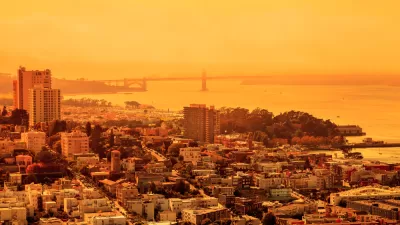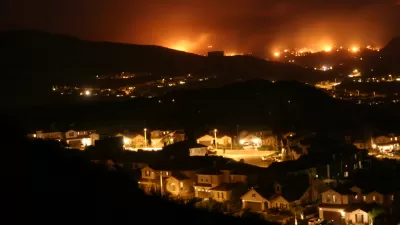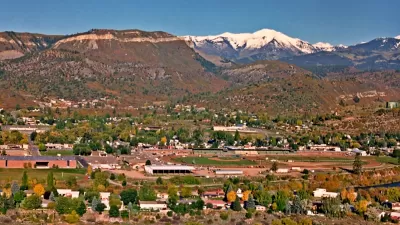Wildfires in California and Colorado are spewing out smoke that is traveling to other parts of the country. The health effects of the dirty air are substantial, and they could last long after the fires are out.

"Record setting conflagrations in California and Colorado have smothered residents of the two states with choking, stinging smoke. But the impact of that smoke is also being felt hundreds, even thousands, of miles away, and the health impacts may last for years after the flames subside," write Michael Kodas and Evelyn Nieves.
Monitoring the impacts of wildfire smoke can be hard because the trail of emissions can be unpredictable and the types of particles and gases in the air depend on what is burning.
"Smoke from burning forests and grasslands can contain everything from carbon monoxide to carcinogens like benzene and formaldehyde, but the two things that health officials focus on are ozone and particulate matter, both of which can travel thousands of miles from the fire that creates them," Kodas and Nieves.
Fine particulate matter can travel far, and the health impacts can be significant. The concern more recently is that inhaling these emissions can make people more vulnerable to the coronavirus, even if they are located far from a wildfire.
Smoke in places such as San Francisco is so bad that residents are unable to leave their homes for any period of time. As a result, they cannot take advantage of walking and outdoor dining, two activities that have helped people cope with lockdowns.
"San Francisco residents are wondering what breathing in the smoke means for their health. Can they be impaired by wildfire smoke the way a person can be sickened by second-hand cigarette smoke? Are the effects cumulative? If so, is living in an increasingly smoky California hazardous to one's health?" add Kodas and Nieves.
FULL STORY: The Fires May be in California, but the Smoke, and its Health Effects, Travel Across the Country

Alabama: Trump Terminates Settlements for Black Communities Harmed By Raw Sewage
Trump deemed the landmark civil rights agreement “illegal DEI and environmental justice policy.”

Study: Maui’s Plan to Convert Vacation Rentals to Long-Term Housing Could Cause Nearly $1 Billion Economic Loss
The plan would reduce visitor accommodation by 25% resulting in 1,900 jobs lost.

Planetizen Federal Action Tracker
A weekly monitor of how Trump’s orders and actions are impacting planners and planning in America.

Waymo Gets Permission to Map SF’s Market Street
If allowed to operate on the traffic-restricted street, Waymo’s autonomous taxis would have a leg up over ride-hailing competitors — and counter the city’s efforts to grow bike and pedestrian on the thoroughfare.

Parklet Symposium Highlights the Success of Shared Spaces
Parklets got a boost during the Covid-19 pandemic, when the concept was translated to outdoor dining programs that offered restaurants a lifeline during the shutdown.

Federal Homelessness Agency Places Entire Staff on Leave
The U.S. Interagency Council on Homelessness is the only federal agency dedicated to preventing and ending homelessness.
Urban Design for Planners 1: Software Tools
This six-course series explores essential urban design concepts using open source software and equips planners with the tools they need to participate fully in the urban design process.
Planning for Universal Design
Learn the tools for implementing Universal Design in planning regulations.
Caltrans
Smith Gee Studio
Institute for Housing and Urban Development Studies (IHS)
City of Grandview
Harvard GSD Executive Education
Toledo-Lucas County Plan Commissions
Salt Lake City
NYU Wagner Graduate School of Public Service





























